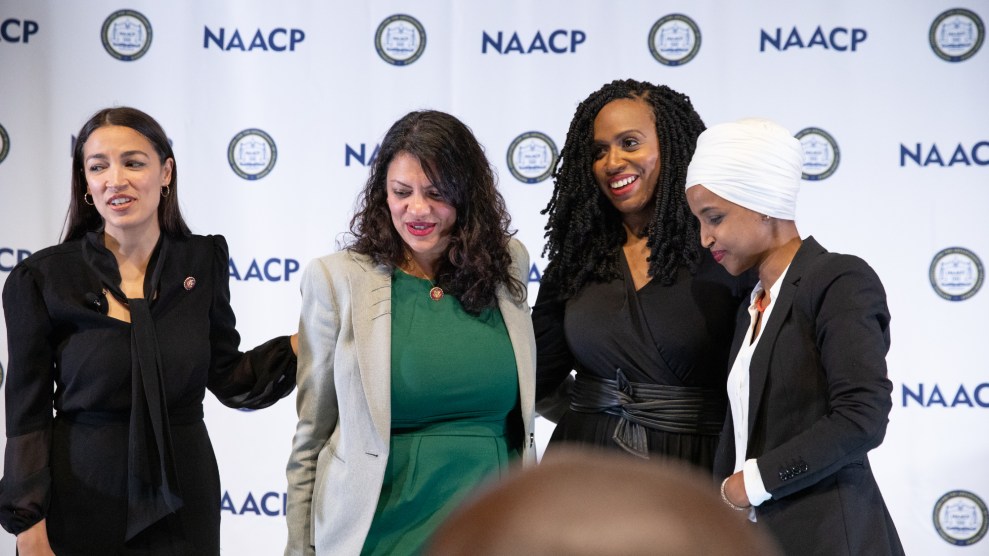
Mother Jones; Leigh Vogel/POOL/Zuma; Unsplash
Kamala Harris has joked about experimenting with marijuana and—unlike another famous Democrat—admitted to a truly shocking act: inhaling. With Joe Biden out of the race, her track record on drug policy as a prosecutor, senator, and vice president is worth revisiting. A Harris administration would be responsible for shaping federal drug policy that would impact the tens of millions of Americans suffering from addiction and the effects of the failed war on drugs. As a prosecutor in San Francisco, she had a slightly higher conviction rate for marijuana-related crimes than her predecessor but later sponsored a bill in the Senate to lift the federal prohibition on marijuana by removing it from the list of substances under the Controlled Substances Act—also known as descheduling. Vice President Harris played a major role in the Biden administration’s messaging around drug policy, even announcing their intention to reschedule marijuana during a March roundtable featuring rapper Fat Joe. Rescheduling marijuana would place it in a category of illegal drugs that are considered less dangerous, making research more viable, but drug policy advocates have criticized the administration for not moving to deschedule the drug.
My hope is that Kamala Harris works to end the drug war.
One advocate calling for the descheduling of marijuana is Kassandra Frederique of Drug Policy Action, a nonpartisan organization working to end the drug war through campaigns and ballot initiatives. Frederique says Harris is “further along in terms of cannabis reform policy” than Biden and that her evolution on drug policy shows promise. I spoke with her about Harris’ track record and what she hopes to see from a possible future Kamala Harris administration.

Can we start by talking about your journey towards advocating for drug policy change? What made you want to get involved in this type of activism?
The more I learned about drug policy and its implications [for] everyday life, I recognized how so much of my own life and the lives of my loved ones were shaped by these policies, and I found a real purpose in working to dismantle the tools that have been really harming so many people for so long.
What do you hope to see from Kamala Harris’ approach to drug policy if she becomes the next president?
My hope is that Kamala Harris works to end the drug war. I think we’ve seen her evolution on certain issues like cannabis. We’ve seen her engagement through the Biden-Harris administration around the overdose crisis and recognizing that people need more access to medication treatment. She’s called out the entities that are exploiting people’s pain. We are in a moment where over 100,000 Americans are dying yearly from overdoses. My hope is that whoever leads the country in the next four years is actively invested in that and is working to actually get the resources to our communities and to end criminalization.
When it comes to marijuana policy specifically, what do you hope to see from the Harris administration if she wins?
What we’re looking for is the descheduling of cannabis. I think we need to remove cannabis from the Controlled Substances Act. When the vice president was a senator, she was a sponsor of the MORE Act, which descheduled cannabis [and] worked on expungement.
My hope is that she would follow the majority of Americans who believe that cannabis should be regulated. Even in the public comment period that just passed, nearly 70 percent of the comments supported descheduling, decriminalizing, or legalizing cannabis at the federal level. That’s a large mandate, and I think it aligns with Senator Harris’ perspective before she became vice president, and we’d like to see her move in that direction.
Your organization has criticized the Biden administration for pursuing rescheduling instead of seeking to legalize marijuana federally. What are the issues that rescheduling doesn’t address?
Rescheduling doesn’t deal with any of the criminal justice issues. People can still be incarcerated. Rescheduling doesn’t address the issues that have made cannabis such a large criminal justice issue, that has gotten people deported or [made] people lose custody of their kids or lose housing. Descheduling would actually trigger policy reforms that will impact the vast majority of people who’ve been harmed by cannabis prohibition.
How was Harris’ record as a prosecutor, senator, and VP? Where have you seen her evolve on these issues?
We’ve seen the most evolution from Kamala through her position on cannabis—slower than we would have liked, but her evolution shows promise. There were things that we struggled with her on when she was a prosecutor in California. But I think if you are a drug policy reformer, you’re always struggling with prosecutors. We worked with her on many pieces of legislation when she was a senator, and we’ve appreciated some of her rhetoric as vice president. There are no politicians currently who are 100 percent on ending the war on drugs.
How do you think the Harris administration could differ from the Biden administration in terms of marijuana policy and drug policy overall?
President Biden has also evolved on cannabis. Has he gone as far as advocates would have liked? No. But he has evolved from where he started. I think Vice President Harris is further along in terms of cannabis reform policy. Our hope is that we can build momentum from what the Biden-Harris administration has done and that a potential Harris administration would be willing to go further.
What do you think is the significance of having someone from the community that is most affected by the war on drugs in the White House leading the nation’s drug policy agenda?
Representation is important, [but] I don’t think representation always equals a difference in policy. For advocates, the mission is still the same. We have to push, we have to educate, we have to agitate to get the things that we know our communities need. And while one can assume that Harris has a closer relationship [with] those things, Vice President Harris was also a prosecutor, so we’ve not always been on the same side. As a senator, we’ve been on the same side more. Our hope is that we’d be able to maintain that.
Is there anything else you think is important to add?
One of the things that Vice President Harris has focused on and really talked about is health equity and maternal health. And there’s an intersection here between the drug war and maternal health, and working to end the drug war is a tool [for] increasing maternal health. Overdose is the fourth leading cause of death for Black women. And I would assume that some of those women are pregnant. So, there’s been a large conversation about the Black maternal health crisis in the US. As we build a health equity agenda, that is a place that would align with where Harris is.
This interview has been edited and condensed for clarity.
















